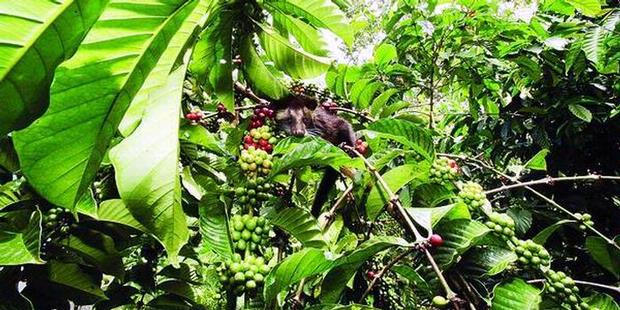14 Jul 2011

The aromatic kopi luwak is brewed from ripe beans that have passed through the digestive tract of the Asian palm civet — a nocturnal, catlike animal known locally as a “luwak.”
Turning normal coffee beans, grown mainly in Sumatra, Java, Bali andSulawesi, into one of the world’s finest beverages is no small feat. Its labor-intensive production process is what makes kopi luwak an expensive luxury. Umul Khairi, who runs a small-scale kopi luwak business inWest Sumatra, said the high cost of the coffee was due partly to its scarcity. “Only around 500 pounds [230 kilograms] of the coffee is produced inIndonesiaeach year,” Umul said, adding that the end product can sell for hundreds of dollars per kilogram.
Established in 2006, Umul’s Rafflesia Luwak Coffee company — named after the flower that blooms once a year in the area — is located in the village of Batang Palupuh, around 90 kilometers north of Padang.
Kopi luwak’s production process begins when the ripe arabica coffee cherries are eaten by wild civets that prowl the jungle for the ripest, choicest beans.
“The coffee beans go through the civet’s digestive system, collecting in the stomach where they sit for around 15 hours before they are excreted,” Umul said. “The digestive process removes the outer layer of the coffee cherries and the process of fermentation takes care of the rest. It’s all to do with the civet’s stomach acids and the enzyme action that takes place in the stomach.”
The indigestible coffee beans exit the civet intact and are harvested from the forest floor by villagers who live on farms bordering the jungle. This is when Umul steps in. “I buy the droppings from the farmers. In each village I have five farmers harvesting for me,” she said.
It is the farmers who first discovered the secret behind the delicious brew. Coffee plantation workers employed by the Dutch in the 18th century who were prohibited from picking coffee fruit for their own use discovered that the undigested beans contained in civet droppings made a smooth cup of coffee. The coffee’s reputation soon spread to Dutch plantation owners, becoming their favorite brew.
Coffee lovers usually attribute kopi luwak’s unique taste to two things — the fact that the civets are able to select the juiciest coffee cherries, which in turn yield the best beans, and the fact that those beans are fermented in the civet’s stomach.
In order to cash in on the lucrative enterprise and make the production process less labor-intensive, some entrepreneurs have started caging civets and feeding them coffee beans. According to Umur, however, this process produces “non-organic” coffee of substantially inferior quality.
“When civets are kept in cages, they sometimes get stressed. In the jungle their diet is more natural,” she said. “Also, civets have a good nose and if they live in the jungle they only select the ripest of coffee cherries instead of having to eat whatever they are given in captivity.”
“InBalithere is also kopi luwak, but it is non-organic coffee from farm plantations,” Umur continued. “It’s sold there to tourists who just want to try the coffee as a novelty rather than for its taste.”
After purchasing civet droppings from local farmers, Umul uses traditional processes passed on to her from her grandmother to ready the beans for consumption.
“I wash the coffee beans five times with water and then put them out in the sun to dry for six days,” she said. “I then sort the beans and roast them in a clay pot for three hours in a traditional kitchen.
The beans are only given a light to medium roast, so as not to destroy the coffee’s complex flavors.
“Kopi luwak is less bitter than normal coffee, but it still has a rich, musty flavor with hints of chocolate. This would be lost if we overroasted the beans,” Umul said.
The beans, she added, are roasted at 75 degrees Celsius for three hours and then roasted for a further two hours at 25 degrees.
“Only cinnamon wood is used in the roasting process, so that the coffee can last longer without chemicals,” Umul said.
Instead of being ground, the coffee is then pounded with a mortar and pestle.
“There is no need for a filter when preparing coffee luwak. Simply mix hot water and one teaspoon of the coffee. Set aside and cover for three minutes. It is then ready to drink,” Umul said.
The demand for kopi luwak is increasing each year, with most of Umul’s customers coming from Asian countries, includingJapan,TaiwanandSouth Korea. Interest in the brew among coffee connoisseurs inEuropeis also increasing.
“I export my coffee to many Asian countries,” Umul said. “I have also exported toAmericaandCanadaand in Europe to theNetherlands,SlovakiaandCzechRepublic.”
Umul follows international standards of quality and Rafflesia Luwak Coffee has been officially certified by Sucofindo International Certification Service. Even so, she says, it is still not easy to export to some countries.
“Australiahas very strict rules when it comes to importing coffee, so for now I only export there in small quantities,” she said.Last year, the precious beans even caused a diplomatic blunder when President Susilo Bambang Yudhoyono brought them as a gift forAustralia’s then- prime minister, Kevin Rudd, but failed to present them for quarantine inspection.
Umul, on the other hand, is determined to play by the rules. “I have recently applied to the department of agriculture inAustraliafor a license to export kopi luwak in larger quantities,” she said.
By : Umul Khairi
Source : Bumn
© Inacom. All Rights Reserved.